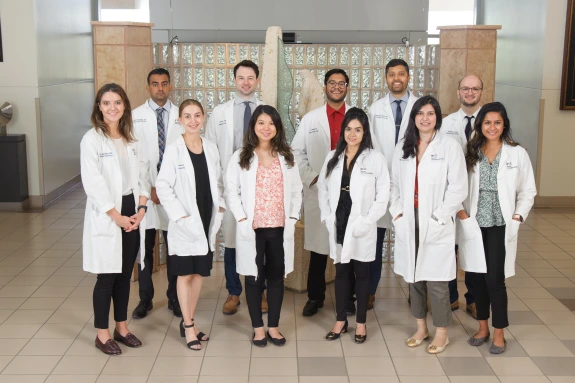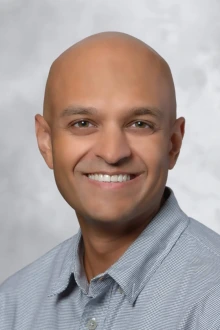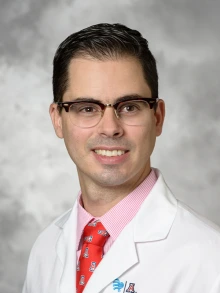
Hematology and Medical Oncology Fellowship Training Program
The fellowship program in Hematology and Medical Oncology is designed to take individuals who have completed internal medicine training in an ACGME certified training program and, using the curriculum described here, have them become eligible to sit for the subspecialty certification examinations, pass them and become certified in both Hematology and in Medical Oncology. An additional goal is to provide each fellow with an experience in research and teaching that, in addition to their clinical training, will prepare trainees completing the program to pursue successful careers in a clinical practice and/or in an academic environment.
The Hematology and Medical Oncology Subspecialty Training Program at the University of Arizona participates in the ABIM subspecialty training program Match and we also use the ERAS central application mechanism.

Akshay Amaraneni, MD, Program Director

Alejandro Recio-Boiles, MD, Associate Program Director
- To become proficient in the medical care of individuals afflicted with blood disorders and/or malignant conditions. Minimum areas of expertise should include proficiency in cancer prevention and control, early detection of malignancy, therapy of early and advanced blood disorders and malignancy, and the care of terminally ill patients.
- To learn to successful advocate for a patient in terms of medical care and psycho-social issues and to feel and display compassion for patients and family members.
- To learn professional attitudes and behaviors in interacting and in communicating with referring physicians.
- To become competent in the following skills and procedures:
- Bone marrow aspiration and biopsy
- Preparation and interpretation of blood and bone marrow smears.
- Administration of chemotherapy
- Therapeutic phlebotomy
- Apheresis
- Managing indwelling central venous access devices
- Performing lumbar punctures with the administration of chemotherapy
- Making serial measurements of palpable tumor masses
- Correlating clinical information with findings on cytologic, histologic and imaging studies
- Managing individuals who are immunocompromised
- To become familiar with the Hematology and Medical Oncology medical literature and resources and to learn to use medical literature and resources to remain up to date and competent in Hematology and Medical Oncology
- To participate in the education of other physicians, staff and support personnel by preparing and presenting didactic lectures and interaction on topics in Hematology and Medical Oncology.
- To participate in the teaching of lower level trainees including medical students, resident and fellows that are engaged in medical training programs ongoing within the College of Medicine and the Arizona Cancer Center.
- To learn and critique the appropriate design and interpretation of Hematology and Medical Oncology clinical and basic research studies including study design, statistical analysis and interpretation of results.
- To gain experience and expertise in clinical and/or laboratory research methods and programs relevant to the subspecialties of Hematology and Medical Oncology.
Traditional ABIM Accredited Subspecialty Fellowship Training Program
- Completion of a United States ABIM accredited residency in Internal Medicine.
- ABIM eligibility to take the United States Internal Medicine certifying examination before the Fellowship training begins. https://www.abim.org/
- If a non-U.S. Citizen, the possession of a U.S. Visa permitting a minimum of three additional years of training in the U.S. (Note: We have occasionally supported an H1-B Visa applicant for a truly extraordinary candidate e.g. an MD, PhD whose research activities match ours.)
- An interest in pursuing a career in Academic Medicine.
Applicant Process
1. We use the ERAS national application process.
2. We participate in the Hematology and Medical Oncology Fellowship MATCH.
- Clinical Resources
- Faculty Members
- Clinical Training Rotations
- Electives and Research
- Conferences (Multidisciplinary Morbidity and Mortality Conferences)
- Core Lectures
- Board Reviews
- Journal Clubs
The clinical training for fellows in the Hematology and Medical Oncology Fellowship training program utilizes the following clinical resources:
University Medical Center
University Medical Center is the primary teaching hospital for the University of Arizona College of Medicine. It is a comprehensive, approximately 400 bed hospital which has devoted approximately 30 in patient beds specifically for the care of patients afflicted with benign and malignant blood disorders or cancer. Patients undergoing bone marrow transplantation are cared for in this in patient facility. The hospital is full service and contains all of the diagnostic and support services associated with a University based teaching hospital.
Southern Arizona VA Health Care Center
The VA Health Care Center in Tucson provides both in patient, out patient and support care services for individuals for health care under the direction of the VA. The facility includes approximately 250 in patient acute beds, approximately 125 supportive beds including palliative care and hospice beds, and large out patient facilities. The hospital is full services and contains all of the diagnostic and support services associated with a teaching hospital.
Arizona Cancer Center
The Arizona Cancer Center is an NCI designated comprehensive cancer center meaning that the Cancer Center members are accomplished in both clinical care, clinical/translational research and basic science research. The Arizona Cancer in 2009 successfully completed review and has had its designation as comprehensive approved for 5 additional years.
University Medical Center North/Arizona Cancer Center Clinic Facility
In 2007 in a joint project University Medical Center and the Arizona Cancer opened 1 250,000 square foot out-patient clinical facility located about 2 miles north of the existing hospital. All out patient clinics held by Arizona Cancer Center members are conducted at this facility and shortly to break ground will be a satellite radiation oncology facility on Cancer Center North Campus and shortly thereafter a comprehensive imaging center. A Ronald McDonald House has been built on the grounds and plans are underway for a hope lodge. More than 80,000 clinical visits occur at this facility each year and more than 15,000 out patient therapies are administered at the facility.
Hematology and Medical Oncology Fellows have nine clinical rotations. These include an in-patient Hematology and Medical Oncology Service at University Medical Center; an in-patient Bone Marrow Transplant Service at University medical Center, a consult and new out-patient referral service at the Southern Arizona VA Health Care Center, an out patient rotation in Breast and Genitourinary Cancer Clinics, and out patient rotation in benign and malignant hematology clinics, and out patient rotation in other Solid Tumor clinics, fellow continuity clinics (two half days each week), clinical electives and research rotations.
Time on these rotations each of the three years can be found here:
- Radiation Oncology
- GYN Oncology
- Coagulation Service and Blood Banking
- Palliative Care/Hospice
- Research
- Includes Multidisciplinary Morbidity and Mortality Conferences
- Includes Quality Assurance Conferences
Each month an attending physician is assigned to run a journal club. The attending selects three or more articles and provides them to a fellow one week prior to the Journal Club. One or more fellows is assigned specifically to review each article and present their findings and critiques of the study design, methods, results and conclusions. The attending physician then leads a summary discussion of each article.
Once or twice a month the chief fellow organizes and conducts a board review session. A particular subject is selected and questions from a board review course on that topic are distributed to the fellows. An attending physician who is expert in the topic being discussed attends and provides analysis of the question and the subject from a board review exam perspective.
Fellowship Core Lectures are held on Fridays from 8-9 a.m. at University of Arizona Cancer Center-North Campus.
Evaluation Tools
- Fellows must complete a rotation evaluation form after completing each rotation.
- Fellows are responsible for making sure their attendings complete their evaluations.
- Every three months the fellow must meet with his advisor.
- Each fellow must meet with the fellowship director to review their evaluations.
Evaluation Procedures
Fellows are required to keep and update regularly a procedure log to document their performance of the subspecialty related procedures. A copy of the log will be permanently placed in the fellow’s file and the fellow is advised to keep the original indefinitely.
Teaching
- Fellows are expected to teach peers, other trainees, students and the lay public.
- This teaching can take the form of clinical teaching during hospital round, lectures or public service talks.
- Fellows may be assigned lectures and public service talks by the Cancer Center Director, the Section Chief, their mentors or the Fellowship Director/Committee.
- All assigned lectures/talks should be reviewed with the fellow’s assigned mentor
Evaluation Process
- Fellows are advanced to positions of higher responsibility on the basis of evidence of their progressive accomplishment and professional growth. This evidence includes:
- Satisfactory completion of rotation
- Documented Attendance of Education Activities
- Core Lecture
- Journal Club
- Morbidity and Mortality Conferences
- Research Conference
- Assessment of the Fellow’s progress in achieving clinical competence in the following General Competencies.
- Patient Care
- Medical Knowledge
- Practice Based Learning and Improvement
- Interpersonal and Communication Skills
- Professionalism
- System Based Practice
- The following evaluation tools are used to assess/evaluate the six clinical competencies.
- Attending physician evaluation of rotations (Evaluation form attached in Appendix)
- Cognitive Tests
- Chemotherapy certification
- Course material presented year one
- Test taken at the end of year one
- Board Examinations
- Test (s) taken after eligibility declared.
- Chemotherapy certification
- 360 degree ratings by coworkers (evaluation form attached in Appendix)
- The following groups will be asked to complete a 360 degree evaluation form:
- Nurse practitioners
- Ward Nurses
- Clinical Pharmacists
- Clinical Nurse Coordinators
- Fellowship administrative assistant
- Chemotherapy nurses
- Clinic schedulers
- Clinical medical assistants
- The following groups will be asked to complete a 360 degree evaluation form:
- Procedure Logs (sample procedure log attached in Appendix)
- Mini-Clinical Evaluation Exercises (evaluation form attached in Appendix)
- A CEX mini-clinical evaluation will be completed by an attending on one fellow during each continuity clinic. There are 3 attendings at the VA and two attendings are present at each University of Arizona Cancer Center continuity clinic. Consequently at least one CEX mini evaluation should be completed every month at both sites.
- Morbidity and Mortality Conference Reports (evaluation form attached in Appendix)
- Fellowship Director Summary Assessments at six month intervals.
- This assessment will include the General Competency Assessments plus Research and Teaching Accomplishment.
- Evaluation form attached in Appendix.
- Summary Assessments
- The fellowship director and the fellowship committee meet at the end of each year of training and determine in summary assessment if the fellow is to advance to additional training.
- Summary assessments will include:
- The General Competency Assessments
- Research Accomplishment
- Teaching Accomplishment
- Summary assessments will include:
- When the fellow has completed all of his/her training, the fellowship director and fellowship committee meet and determine in a final summary assessment if a fellow is to be declared board eligible to take either the Medical Oncology Subspecialty certification examination or the Hematology Subspecialty certification examination or both. Each advancement is communicated to the GME Office by the submission of a yearly summary assessment or completion summary assessment.
- The fellowship director and the fellowship committee meet at the end of each year of training and determine in summary assessment if the fellow is to advance to additional training.
Title: An ongoing review/assessment of the care delivered by fellows during their continuity clinics as documented in their clinic notes.
Method: Each month a clinic note will be selected at random, one each from the VA continuity clinic for each fellow and one from each fellow’s Cancer Center North Continuity clinic. Both notes each month on each fellow will be reviewed and graded by a member of the fellowship committee. The assigned faculty member will grade the clinic note based on the 10 criteria described below using the numerical grading system described below. Grades in each criteria will be compared to a target score of 3 or 4 in all areas...
Selection of Patients to Review: Each month two patients’ (one from the VA continuity clinic and one from the Cancer Center North continuity clinic); notes will be selected by chance from all the notes completed by a fellow. The reviewing faculty member will be presented with a printed out electronic note for the patients to be reviewed and the faculty member will assess and grade the fellow’s clinic note in regards to the following 10 criteria
- Documentation of who was present during the visit
- Historical Summary of Disease Course Provided
- Description of patient symptoms present including performance status
- Description of adverse effects from treatment
- Documentation of disease sites found on physical exam
- Description of new/recent diagnostic study results
- Assessment of disease status/treatment status Described
- Therapeutic/Diagnostic Management plan described
- Evidence of patient/family education documented
- Chart easy to read, few grammatical errors.
Scoring System:
- Not Well | Adequately | In Adequately
- Applicable Described | Described | Described Absent
- NA 4 3 2 1
Target Score of 3
All scores 2 or less will be discussed with the fellow:
- Every six months summary scores will be reviewed with faculty and fellows.
- If the average fellow score for any criteria is below 3 then an educational program/activity will be designed and provided to the fellows. Ongoing monitoring/grading will continue and trends for improvement will be evaluated 3 months later.
The Integrative Medicine in Hematology Oncology Fellowship Program
The Integrative Medicine in Hematology Oncology fellowship program is the first of its type in the nation. Founded in July 2022 as a collaborative fellowship with Mayo Clinic Arizona. Enrolled fellows are currently following the general curriculum for Hematology Oncology Fellowship concurrently with the IMHO curriculum. The fellowship program will prepare the fellows to be Board Eligible for the Integrative Medicine Boards, should they decide to take them.



